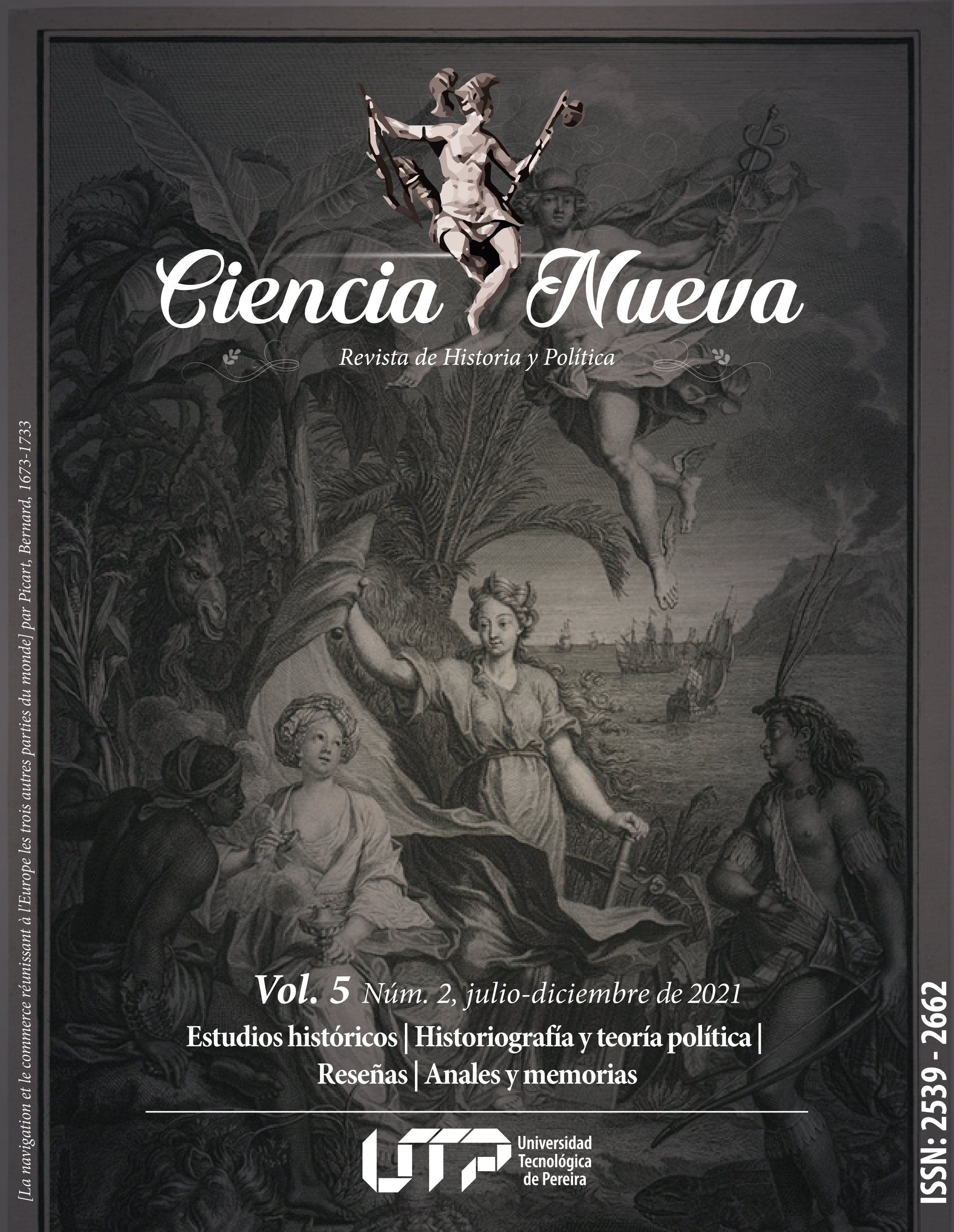Luther and the Plague in Wittenberg
DOI:
https://doi.org/10.22517/25392662.24913Keywords:
Black Death, The Pest in the xvi Century, Pest in Wittenberg, Luther and the Pest, Reformation and the PestAbstract
This article analyzes the pest of 1527 at Wittenberg, where Luther was leading his reform; Lutheridentified The Black Death, the date of arrival and its effects, and the answers to them. These answers corresponded to the medical understanding of that age, to the Reformed theology and to the needs of that historical context, which needs to be reinterpreted from the context of the current pandemic. With an Interpretative Approach of the historical data of the city and Luther’s personal letters these answers are reinterpreted from an Interdisciplinary perspective. The conclusion includes some reflections on the covid pandemic.
Downloads
References
Fuentes primarias
Currie, Margaret A., trad. The Letters of Martin Luther. London: Macmillan and Co. Limited, 1908.
Lull, Timothy F., ed. Martin Luther´s Basic Theological Writings. Minneapolis: Fortress Press, 1989.
Smith, Preserved, ed. The Life and Letters of Martin Luther. Boston: The Cambridge University Press, 1911.
Smith, Preserved y Charles M. Jacobs, eds. Luther´s Correspondence and Other Contemporary Letters, vol. 2 (1521-1530). Philadelphia: The Lutheran Publication Society, 1918.
Tappert, Theodore G. ed. Luther. Letters of Spiritual Counsel. Louisville: Westminster John Knox Press, 2006.
Fuentes secundarias
Arrizabalaga, Jon. «La peste y el discurso médico (1348-1720)». Historia, 16/247 (1996): 52-58.
Bramanti, Barbara, Nils Chr. Stenseth, Lars Walloe y Xu Lei. «Plague: A Disease Which Changed the Path of Human Civilization». En Yersenia Pestis: Retrospective and Perspective. Advances in Experimental in Medicine and Biology, vol. 918, editado por Ruifu Yang y Andrey Asinimov, 1-26. Dordrecht: Springer, 2016.
Bustamante, Roberto E. «Domini Sumus: El abordaje pastoral de Lutero a la pandemia por saturación cristológica de la imaginación de la fe, III Simposio de Teología Luterana Confesional – CMSCR 28 de mayo de 2020».
Cortright, Charles L. «Poor Magoot Sack that I am: The Huma Body in the Theology of Martin Luther». PhD. Dissertation, Marquette University, 2011. https://epublications.marquette.edu/cgi/viewcontent.cgi?article=1101&context=dissertations_mu
Egido López, Téofenes. «Lutero. Rasgos de su espiritualidad». Revista de Espiritualidad 76 (2017): 313-334. Acceso el 7 de noviembre de 2021. http://www.revistadeespiritualidad.com/upload/pdf/2540articulo.pdf
_____. Las reformas protestantes. Madrid: Editorial Síntesis, 1992. https://issuu.com/lcervortiz/docs/egido-reformasprotestantes
Hays, J. N. Epidemics and Pandemics. Their Impacts on Human History. Santa Barbara: ABC Clio Inc., 2005.
Johnson, Anna Marie. «Whether One May Flee from a Deadly Plague. 1527». En The Annotated Luther, vol. 4, editado por Mary Jane Haemig, Hans J. Hillerbrand, Kirsi I. Stjerna y Timothy J. Wengert, 385-409. Minneapolis: Fortress Press, 2016.
Junghans, Helmar. «Luther´s Wittenberg». En The Cambridge Companion to Martin Luther, editado por Donald K. McKim, 20-35. Cambridge: Cambridge University Press, 2003.
Landon, William. «Plague in Europe, 1500-1770s». En Encyclopedia of Pestilence, Pandemics and Plagues, vol. 2, N-Z, editado por Joseph P. Byrne, 502-506. Westport: Greenwood Press, 2008.
Marshall, Louise. «Plague Literature and Art, Early Modern European». En Encyclopedia of Pestilence, Pandemics and Plagues, vol. 2, N-Z, editado por Joseph P. Byrne, 522-530.
Naphy, William G. Plagues, Poisons and Potions. Plague Spreading Conspiracies in the Western Alps c. 1530-1640. Manchester: Manchester University Press, 2002.
Piacenza, Cardenal Mauro. «Decreto de la Penitenciaría Apostólica relativo a la concesión de indulgencias especiales a los fieles en la actual situación de pandemia, 20.3.2020». En Vatican. 19 de marzo de 2020. http://press.vatican.va/content/salastampa/es/bollettino/pubblico/2020/03/20/pande.html
Ramírez Z., Alberto. «Martín Lutero y la reforma del cristianismo occidental». En El diálogo ecuménico y el pensamiento de Calvino en sus 500 años, editado por Carlos Ángel Arboleda Mora y Fernando Alexander Sanmiguel Martínez, 83-106. Medellín: UPB, 1915.
Red Ecuménica de Educación Teológica. «Declaración interreligiosa en razón a la pandemia de COVID-19 en América Latina y el Caribe». 21 de abril 2020.
https://reet.org.ar/2020/04/21/declaracion-interreligiosa-en-tiempos-de-pandemia/
Rotterdam, Erasmo. «Elogio de la locura. Habla la estulticia». Biblioteca Virtual Miguel de Cervantes. http://www.cervantesvirtual.com/obra-visor/elogio-de-la-locura--0/html/ff08f70e- 82b1-11df-acc7-002185ce6064_13.html#I_0_
Runham, Nathan. «Why Did Luther Not Flee from the Deadly Plague». Stimulus. The New Zealand Journal of Christian Thought and Practice, vol. 27, n.º 3 (2020). https://hail.to/laidlaw-college/publication/z0YvCh2/article/otABdxy
Wachholz, Wilhelm. «Se é permitido fugir diante da ameaça de morte. Lutero e a epidemia da peste em Wittenberg». Estudos Teológicos vol. 60, n.º 2 (maio/ago 2020): 372-389. http://periodicos.est.edu.br/index.php/estudos_teologicos/article/view/4004
Wengert, Timothy J. «Luther and the Deadly Plague». Lutheran Quarterly 5/4 (2020).
http://www.lutheranquarterly.com/online-features/archives/05-2020
Downloads
-
Vistas(Views): 1145
- PDF (Español (España)) Descargas(Downloads): 402
- HTML (Español (España)) Descargas(Downloads): 269
Published
How to Cite
Issue
Section
License
Copyright (c) 2021 César Gerardo Carhuachín

This work is licensed under a Creative Commons Attribution-NonCommercial-NoDerivatives 4.0 International License.
For all articles published in Ciencia Nueva, revista de Historia y Política, the ownership of the exploitation rights of the contents of the journal belongs to the author(s).
The works of this magazine are under the Creative Commons Recognition-NonCommercial-DerivativeLicense:




